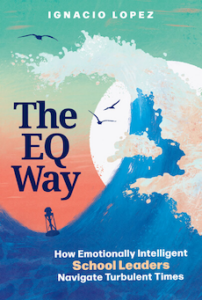Use Emotional IQ Skills to Navigate Turbulence
The EQ Way: How Emotionally Intelligent School Leaders Navigate Turbulent Times
By Ignacio Lopez
(ASCD, 2024 – Learn more)
Reviewed by Jeanette Pine

Further, all leadership decisions must be dedicated to the proposition that students must always be the beneficiaries of every arrangement’s outcome.
The tacit gauntlet Lopez has thrown down is how to achieve and judiciously wield these objectives.

Applying research to reality
The real work begins at the end of each chapter. Lopez challenges the reader to reflect upon how to apply research to reality. This is no easy task and requires ruthless honesty and resolute courage. In that way, the book reflects what might best be described as a spiritual quest. Service is always more challenging than ego-driven leadership. As a result, the series of guided questions at the end of each chapter require deep and thoughtful dedication.
For some, this may upend a “business as usual” philosophy. What Lopez suggests requires moral courage. Yet despite his call for intellectual rigor, Lopez is gentle. The case studies are less judgmental and more instructive and serve as parables, offering ways to recognize less successful behaviors and suggestions to adjust for change through thoughtful action. Former leadership styles (“because I said so and I know best”) may have worked in the past – or may work for a short while – but surely fail long term.
Self-reflection and an unwavering commitment to personal honesty are the foundation for strong relationship building and that, in effect, is what underscores effective organizational leadership. This means one must reconsider previously held thoughts about how things are done. It means building coalitions that may not see eye to eye all the time but will agree to work toward the shared goal. It requires navigating uncertainty responsibly. Many of the challenges posed at the end of each chapter invoke team effort.
Switching off the ego
Lopez believes that true authority is derived from good stewardship. That is, being ever mindful that leaders are careful and responsible managers of the organization entrusted to their care. Trust, above all, is a vital aspect of leadership.
Lopez encourages leaders to switch off egos because educational leadership especially is as much a vocation as an avocation. Leaders steer the ship but cannot successfully navigate without the assistance of all who travel with them.
Although the book is a short read, what is asked of the reader in The EQ Way requires a lifetime of personal reflection. Leaders must encourage input from disparate interests. Leaders must be open to the inevitable buffeting of naysayers and resistors by using EQ tactics to build “trust among skeptics.” Leaders must relentlessly seek to understand the “why,” and this work is more important than pushing an agenda simply because one believes it is the right thing.
Leaders must be keen on developing a coalition of disparate viewpoints. Leaders must take full responsibility for decisions and outcomes, intended or unintended. Ultimately, it is up to the leader to remind everyone under their care that they share a common and all-abiding principle: that educational leadership must always put students’ needs first.
When it’s time to leave
The most surprising and unexpected aspect of a book dedicated to educational leadership appears at the end. The final chapter acknowledges that there is a time and place for everything, including leadership tenures.
For Lopez that means having the self-awareness and the grace to know when it is time to leave an organization. He notes, “A leader who turns around a school or district, who lifts it out of the gutter, doesn’t necessarily have the skills required to sustain these improvements.” (99),
The guiding questions to determine an exit strategy require the kind of courage one rarely sees in any organization (“can you identify when your ego is starting to get in the way of moving forward…(and) how do you know when you have succeeded in quieting your ego?” p. 101).
Finally, outgoing leadership actions that incorporate succession planning, including a timetable, will help to ensure successful transitioning while still supporting the growth of the school community.
This is a book whose principles could easily be applied to any organization.
Jeanette Pine has been teaching reading and writing to elementary and middle school students for over 20 years and earned her MA Bilingual/ESL Education from Seton Hall University. She is a member of The Early Learning Networked Improvement Community of New Jersey (ELNIC) and is engaged in collective problem solving disciplined by applying improvement science methods that lead to scalable, sustainable and lasting improvement. She believes the benefits of literacy go far beyond academic achievement and are a fundamental civil right.




























